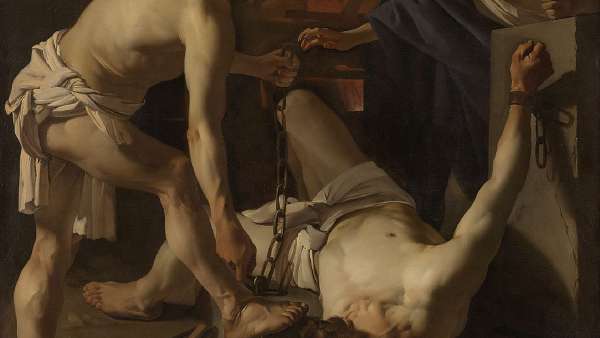The scene opens; Prometheus, the fore thinking one, has defied Zeus in giving various knowledge to mankind, thus incurring his wrath. Hephaestus is nailing Prometheus to a craggy mountain face reluctantly, spurred on by Might and Violence. The immediate parallels with the fall of Man present themselves in the modern context. The imagery is inverted, with the rebel suffering at the hands of a tyrannical ruler of the universe for helping mankind. Prometheus is a fire bringer, one who illuminates. He claims to have liberated man from ignorance. Is man really better off with reason, conciousness and knowledge?
Whether or not man is better off for what Prometheus has done, Prometheus is blessed with the gift of foresight. He knew beforehand the volume of his suffering and how it would come to an end. He still made the choice to ease the suffering of mankind, at his own expense. Prometheus has no fear of death, and has taken the foresight of death away from mankind; thus freeing them to explore knowledge, spurred by the ephemeral nature of mortal existence.
Zeus is presented in the dialectic of the characters as a young tyrant, eager to make an example of those who would defy him. This is what leads to the overzealous punishment of Prometheus, doomed to have his liver eaten daily and never die. This viewpoint of Zeus as arbitrary, capricious and tyrannical is also present in other works of this time period. Aeschylus seems to be solidly on the side of Prometheus in his writing. While Prometheus' actions are seen as a sin by Zeus, they are not in the general story. In furtherance of this, we see the suffering of Io, who is the matrilineal ancestor of Heracles. Prometheus tells her how to end her torture at the hands of Zeus, for his own long term benefit.
Can Might exist without Violence? Does Zeus need to act the tyrant to maintain power? Does Might exist without Force behind it in our world today? Was what Prometheus did a Sin? In some ways we are left with more questions then answers, a lot to chew on.
Prometheus Bound is the central play and remainder of a trilogy written by Aeschylus about the being who created mankind. Although the other plays are largely lost to us, we learn that he was bound for thirty thousand years in the surviving fragments of The Firecarrier. We also know that he was later freed by Heracles in Prometheus Unbound. Zeus allows this in exchange for Prometheus revealing the prophecy of Zeus' possible downfall in lying with Thetis, whereby a son stronger than the father would be born. The redirection of this threat leads to the birth of Achilles.
Where to Read or Watch Prometheus Bound
I read through the University of Chicago Press edition, which I did not find to be a supremely readable edition, it is also available for free on Project Gutenberg. Reading the play and thinking about how you would direct it, or seeing it live is likely the best way to grasp it fully. In lieu of that, here is the best online production of the play I could find:
